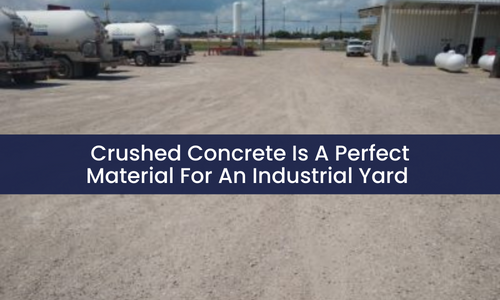Crushed concrete offers a lot of advantages to builders and their clients. The material is used in a number of applications and construction projects and is an ideal base layer option. One project that’s ideal for crushed concrete is an industrial yard or lot.
What Is Crushed Concrete?
Crushed concrete is the result of the concrete recycling process – a process that’s been around since the 1940s. Although stone construction methods have been around for millennia, the technology to efficiently crush and transport concrete didn’t exist until recently.
Recycling concrete is important because the material does not biodegrade. If dropped in landfills, concrete will sit there indefinitely. Recycling the concrete puts it back where it’s most useful – in a variety of concrete structures and applications. Keeping concrete out of landfills reduces the likelihood of contaminants leeching out of any concrete materials and into the soil.
The concrete recycling process takes concrete debris and waste from a variety of sources. Destroyed slab foundations, buildings, sidewalks, roads and curbs are some examples, but not the only ones. A series of industrial crushers reduce the debris to smaller and smaller pieces, and this aggregate is sorted by size. Once sorted, it can be used in many ways.
How Is Crushed Concrete Used In Construction?
There are multiple sizes of crushed concrete, and each has its own purpose. For example, the largest aggregates can be used in retaining walls and to defend against wind or water erosion. You’ll see large pieces of crushed concrete referred to as “rock armor” for this reason.
Smaller pieces of concrete gravel are a perfect base material for roads, walkways, landscaping, sidewalks, driveways, garden beds and large areas intended for commercial or industrial lots.
Prior to or during placement, crushed concrete is washed to remove any dirt, sand, and any other types of dust. This improves the look and performance of the crushed concrete and is another safeguard for the environment.
Why Is Crushed Concrete Ideal For Industrial Yard Paving?
Crushed concrete offers many benefits to contractors. Although it’s not typically used as a surface material, its properties make it a high-quality support material. As a result, it’s used as a primary alternative to virgin quarry materials. Here are some of the benefits of working with crushed concrete:
- It’s economical – Bottom line, crushed concrete is far less expensive than newly mined aggregate such as limestone. There are several reasons for this. Crushed concrete providers charge less per unit because it costs less to salvage old concrete than it is to produce new aggregate from a quarry. Further, crushed concrete provides superior yield, so less of it will go to waste.Crushed concrete is also lighter than new concrete and mined aggregate, so it’s less expensive to transport and work with, as a result.
- It’s durable – Crushed concrete possesses excellent compressive strength and can withstand repeated heavy loads when installed at the proper thickness and thoroughly compacted. Given the amount of force crushed concrete can handle, it is an ideal base layer for industrial yards, driveways, parking lots, building lots and any space that sees a lot of traffic.
- It’s resistant to thermal flux – Crushed concrete has a greater “R” value compared to newly quarried material. In construction, a material’s R value corresponds to its thermal insulating capacity. The higher the R value, the better the material is at insulating against heat. Because crushed concrete resists thermal flow, it resists the kind of thermal expansion that could cause structural stress. Put simply, crushed concrete performs well in high temperatures.
- It’s versatile – Crushed concrete is available in a range of sizes and is appropriate for everything from modest garden beds to massive parking areas. Even if plans change during a project, crushed concrete can usually be repurposed in some way. It can be used to improve the strength and durability of a surface, improve drainage, or improve aesthetics, depending on the type of material you use. There are few limitations on what crushed concrete can do for contractors and their clients.
- It’s green – We’ve touched on the environmental benefits of crushed concrete, but there’s more to add. In addition to reducing landfill waste, crushed concrete reduces the impact of quarry mining on the environment. Recycling concrete also reduces carbon output compared to mining new material, which is of further benefit to the environment.
The only potential drawback to crushed concrete, and the more expensive crushed limestone, is that they are known to become dusty. However, there is a solution—for additional dust suppression, a crushed concrete yard can be prime coated or topped with a couple inches of recycled asphalt millings.
When planning your industrial yard, be sure to choose a company with plenty of experience laying down commercial and industrial yards with crushed concrete bases. This process involves many steps, starting with removing debris, plants, and rocks from the property. There’s also extensive grading and shaping required to prepare the site, and then the layering of material. It’s a labor-intensive job that requires experience, heavy equipment, manpower, and planning. Also, when purchased from a qualified supplier, crushed concrete can meet the standards required by Texas Department of Transportation (TXDOT) for road base material.
- HOA & Condos – How Asphalt Pavement Can Affect Your Houston Property Values - March 6, 2025
- What Certifications or Licenses Should a Houston Asphalt Contractor Have? - September 17, 2024
- Common Challenges in Concrete Construction - September 11, 2024

